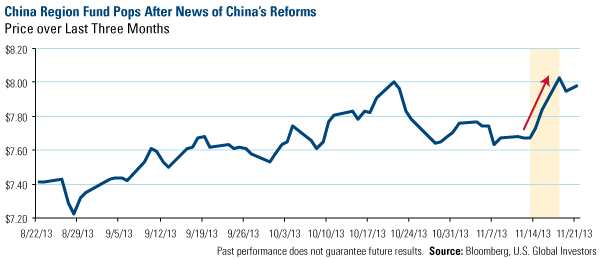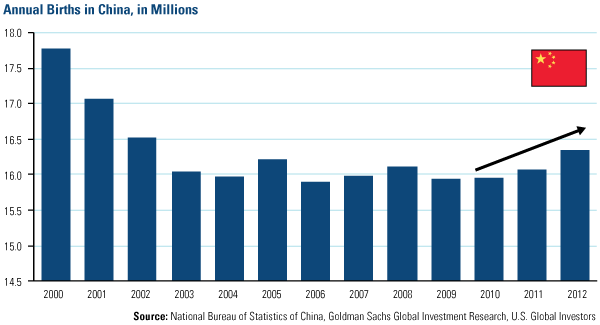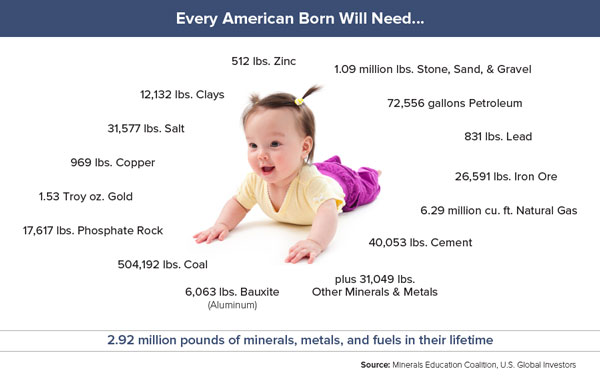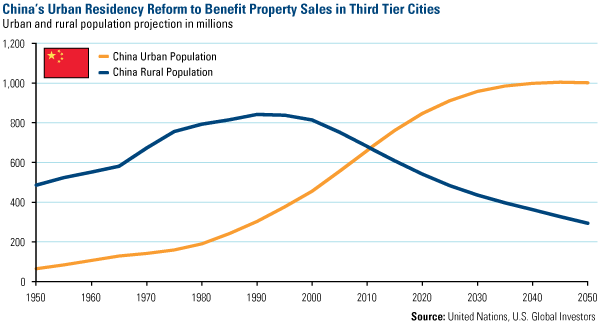Understanding the Rise of China
November 22, 2013
By Frank Holmes, CEO and Chief Investment Officer, U.S. Global Investors
If the sweeping economic reforms planned by Chinese leaders during the Third Plenum can be our guide, it looks to be a promising decade for global investors. Details released this week confirmed President Xi Jinping’s concerted efforts to move China toward a market-based economy that mirrors the West.
The plan’s comprehensive nature and the level of clarity evidently pleased investors, as many Chinese stocks experienced a pop this week. We’re pleased U.S. Global Investors’ China Region Fund (USCOX) also participated:
See complete fund performance here.
We believe the positive effect on the equity markets will not be short-lived or limited. A component of U.S. Global’s investment process is to closely follow government policies because they tend to be precursors to change. Xi’s policies, if successfully implemented, “will undoubtedly have profound long-term implications for the Chinese economy and society at large,” spanning economic, political, cultural, social and environmental issues, says BCA.
Some say the sweeping reforms will have an impact similar to the momentous changes following the Third Plenary Session in 1978, when Deng Xiaoping instilled the concept of free markets and ushered in a new economic era.
“Covering 15 major areas and 60 key points, the document is specific, substantial, comprehensive and actionable,” says Jefferies. The changes are so significant, it “rivals that of 1978, when Deng Xiaoping declared the opening of China,” says the research firm.
I asked Michael Ding, CFA, portfolio manager of the China Region Fund, to share his thoughts regarding these sweeping changes and the potential effects on the markets. He has fascinating insight on this subject, as Michael grew up in rural Dalian and is of the same generation as the nation’s leaders. This age group was raised in the era of severe government controls, such as food rations; still fresh in their leaders’ minds was the stagnation of the country.
Improving market inefficiencies is one significant and positive effect, says Michael. Currently, government interventions prevent companies from setting competitive prices. Releasing control should allow the market to decide what prices should be and where labor and capital should be allocated.
BCA says that three areas likely to see improvements in pricing mechanisms include money, resources and land. Changing the pricing mechanism of money influences the exchange rate and interest rates. The research firm says that “the proposed reforms involve freer cross-border capital flows, improved convertibility of the RMB and eventually a market-driven floating exchange rate system.” In addition, more liberal interest rates should allow markets to price capital based on risk and supply and demand, says BCA.
When it comes to resources, the government plans to reduce subsidies and “administrative meddling” in several sectors, including water, petroleum, natural gas, electricity, transportation and telecommunications, which should allow for more competition, according to BCA.
The reforms affecting the pricing mechanism of land will likely allow for the equal treatment of rural and urban lands. Whereas the government formerly seized rural land, people who live in rural areas in the future could “monetize the rising value of rural residential land” and ease supply shortages in major cities, says BCA.
Included in the considerable social changes are relaxing the one-child policy and reforming the hukou system. Hukou is China’s residency status system. Now, couples will be allowed to have two children if one parent is an only child. This change wasn’t a surprise to us, as it follows the rise we’ve seen in birth rates in recent years. As you can see below, the number of annual births in China has been increasing since 2011. In many cases, with rising incomes, couples can afford to pay the required fine.
Changing the one-child policy could be the beginning of a rising demographic cycle in China, which bodes well for a wide range of companies. The country may see an increase in demand for residential housing and social housing, income protection products, and child-targeted products, such as infant formula. The change may also boost demand for larger vehicles, such as sport-utility vehicles, and Internet companies could benefit from increased users in the years ahead, according to Citi Research.
Demand on resources will be great, as each person requires a huge supply of resources throughout his or her lifetime. Consider that in the U.S., over the course of a lifetime, each person needs 72,556 gallons of petroleum, 6.63 million cubic feet of natural gas, 978 pounds of copper, and 27,416 pounds of iron ore, according to the Minerals Education Coalition. Even though China currently uses fewer resources per capita compared to developed countries, the nation is quickly catching up to developed world levels.
The decision to reform the hukou is also equally important for resource investors. The plan will gradually allow rural migrants to become official city residents. While it may be expensive, “the Party has no choice but to provide migrant workers and their families with equal access to education, health care and other urban social services,” writes Andy Rothman from CLSA.
We’ve discussed the incredible implications for China. In a previous commentary, I wrote:
If the government reforms the hukou, it is estimated that 600 million people might move to the cities over the next 20 years. This includes 300 million migrants becoming “new urban residents” and 300 million rural residents moving to urban areas by 2030, says Citi Research. According to its data, “urbanization could bring another 150 million surplus rural laborers to the cities.”
With more workers living in cities, property sales in China’s 600 third-tier cities could significantly benefit from hukou reform, as about 100 million migrant workers currently reside in these cities.
The Power Couple of the East
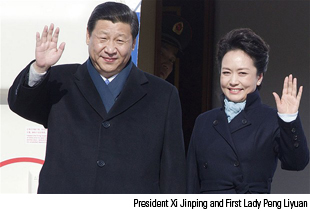 This week, Americans are reflecting on the 50th Anniversary of the assassination of John F. Kennedy. His death was devastating, as it essentially ended the Camelot reign full of potential and promise for the country’s future.
This week, Americans are reflecting on the 50th Anniversary of the assassination of John F. Kennedy. His death was devastating, as it essentially ended the Camelot reign full of potential and promise for the country’s future.
Today, Chinese President Xi Jinping and First Lady Peng Liyuan are ushering in a Camelot era for China. Similar to the Kennedys, the couple symbolizes the economic and ever-advancing strength of the country.
Xi, a princeling, is the son of Xi Zhongxun, who was among the first generation of Chinese leadership. His father’s claim to fame was in creating a special economic zone in Shenzhen, transforming the area from a small village to one of the fastest-growing cities in the world and one of the busiest container ports in China.
First Lady Peng is very familiar with the limelight, as she was once more famous than her husband, singing patriotic songs in the People’s Liberation Army. Peng is very different from previous Chinese first ladies, who were typically invisible to the rest of the world. As the rest of the world gets to know her, the first lady will likely broaden the appeal of China.
Looking ahead, Xi, together with the new leaders, appears to have the “confidence and determination to lead the nation,” according to Jefferies. We look forward to watching the new leaders put their reforms in place, and agree with Jefferies when they suggest that China could be “on the cusp of a massive multiyear bull run.”
What Investors May be Missing in Europe
With the recovery in Europe underway, there have been a record number of flows into European equities. We believe a better strategy to gain access to the European recovery is to head east. Watch the webcast now to hear Portfolio Managers John Derrick and Tim Steinle talk about ways to potentially profit.






